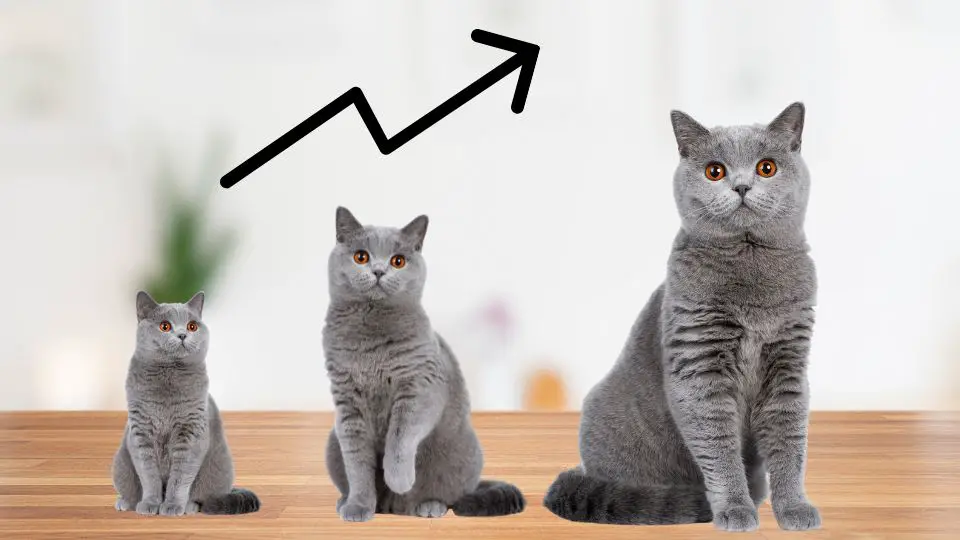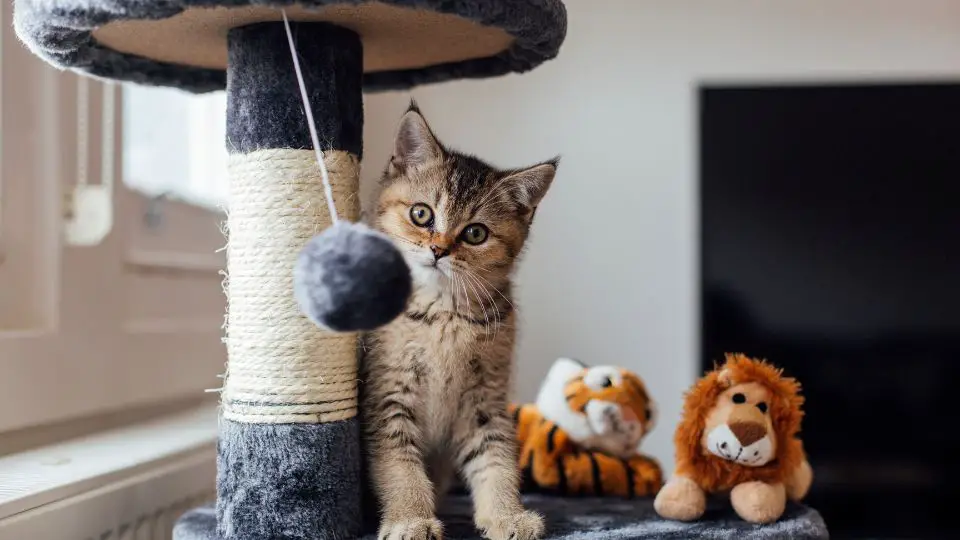As carnivores to the bone, the British Shorthair cat’s natural diet consists of meat. While many cat owners choose to feed their pets commercial cat food, some may wonder whether their British Shorthair can eat raw meat.
Raw meat diets have become increasingly popular among pet owners seeking to provide a more natural and nutrient-dense diet for their cats.
In this article, we will explore whether British Shorthairs can eat raw meat, the benefits and potential risks of feeding raw meat, and how to safely incorporate it into your cat’s diet.
Can british shorthair eat raw meat?
Yes, British Shorthairs can eat raw meat as they are natural carnivores. While it is generally safe, you should exercise caution when feeding them a raw food diet. Improper handling or preparation of raw meat can lead to foodborne illness or bacterial infections, which can be harmful to your cat’s health.
It is recommended to consult with your veterinarian before switching to a raw food diet and to follow proper food safety guidelines to ensure your cat’s health and well-being.
Pros and Cons of feeding raw meet to your British Shorthair
Pros
- Nutritional Benefits: Raw meat is rich in essential nutrients such as protein, vitamins, and minerals, which can benefit a cat’s overall health and well-being. It can also help promote healthy muscle growth and development.
- Improved Digestion: Raw meat is easier for cats to digest than processed kibble or canned food, which can contain fillers, preservatives, and other additives that may irritate a cat’s digestive system. This can potentially lead to better nutrient absorption and a healthier digestive system.
- Dental Health: Chewing on raw meat can help keep a cat’s teeth clean and healthy by removing plaque and tartar buildup. This can potentially lead to improved dental health and a lower risk of dental issues such as periodontal disease.
- Increased Hydration: Raw meat has a high moisture content, which can help keep cats hydrated and reduce the risk of urinary tract issues such as urinary tract infections.
- Potential Weight Control: Feeding raw meat can potentially help control a cat’s weight by providing a more natural and balanced diet that promotes healthy digestion and nutrient absorption.
Cons
- Risk of Bacterial Contamination: Raw meat can be contaminated with harmful bacteria such as Salmonella or E. coli, which can pose a health risk to cats and humans alike. Handle and prepare raw meat properly to reduce the risk of contamination.
- Nutritional Imbalances: Raw meat diets can be difficult to balance properly, which can potentially lead to nutritional deficiencies or imbalances. This can impact a cat’s overall health and well-being and potentially lead to long-term health issues.
- Increased Cost: Feeding a raw meat diet can be more expensive than traditional cat food, as high-quality meat can be pricey and may require additional supplements to ensure proper nutrition.
- Inconvenience: Preparing and storing raw meat can be time-consuming and may require additional equipment such as a separate freezer for storage.
- Potential Health Risks: Feeding raw meat can potentially increase the risk of health issues such as gastrointestinal upset, pancreatitis, or intestinal obstruction.
It’s important to consider both the potential benefits and risks of feeding raw meat to your British Shorthair cat and to consult with your veterinarian to determine if it is the right diet for your cat’s individual needs and health concerns. Proper handling, preparation, and balance of the diet are essential for ensuring your cat’s safety and well-being.
Do cats prefer cooked meat or raw meat?
Cats are known to be obligate carnivores, meaning that they require a diet that consists primarily of meat to meet their nutritional needs. However, the question remains: do cats prefer cooked meat or raw meat?
There is no definitive answer to this question, as cats can have individual preferences when it comes to their food. Some cats may prefer cooked meat, while others may prefer raw meat. However, there are some potential factors to consider when determining your cat’s preferences:
- Taste: Cats have a keen sense of taste and may prefer the flavor of cooked meat over raw meat. Cooking can also enhance the aroma and flavor of the meat, making it more appealing to some cats.
- Texture: The texture of food can also impact a cat’s preference. Cooked meat is typically softer and easier to chew, while raw meat can be tougher and require more effort to eat.
- Smell: Cats have a strong sense of smell and may be more attracted to the smell of raw meat, which can be more pungent than cooked meat.
- Nutritional Value: Both cooked and raw meat can provide essential nutrients for cats, but it’s important to ensure that the diet is balanced and meets their nutritional needs.
In summary, while there is no definitive answer to whether cats prefer cooked or raw meat, consider your cat’s individual preferences, nutritional needs, and potential risks when determining the best diet for your feline friend.
Raw meat for British Shorthair
Not all types of meat are suitable for feeding raw to cats. Here are some types of meat that are generally considered safe and nutritious for feeding raw to British Shorthair cats:
- Chicken: Raw chicken is a good source of protein and contains essential amino acids that are good for a cat’s health. Remove the skin and bones before feeding to reduce the risk of choking and gastrointestinal upset.
- Turkey: Turkey is another good source of protein and contains essential nutrients that can benefit a cat’s health. the same as for chicken, remove the skin and bones before feeding.
- Beef: Raw beef is a good source of protein and contains essential nutrients such as iron and zinc. Choose lean cuts of beef and to avoid feeding raw ground beef, which can be more prone to bacterial contamination.
- Rabbit: Raw rabbit is a good source of protein and contains essential nutrients such as vitamin B12 and iron. Choose high-quality rabbit meat and to ensure that it is free from contaminants.
- Fish: Raw fish can be a good source of protein and essential fatty acids for cats. Choose fish that are low in mercury and to avoid feeding raw salmon or trout, which can contains parasites that can be harmful to cats, such as tape worm.
When feeding raw meat to your British Shorthair cat, make sure that the meat is fresh and of high quality. Handle and prepare the meat properly to reduce the risk of bacterial contamination. Additionally, it’s essential to ensure that the diet is properly balanced and meets your cat’s nutritional needs.
Can raw meat make my British Shorthair aggressive?
While feeding raw meat to cats can provide essential nutrients, there have been some concerns about the potential impact of raw meat on a cat’s behavior, particularly in terms of aggression.
While there is no definitive evidence to suggest that raw meat can make a British Shorthair cat aggressive, there are some potential factors to consider:
- Bacterial Contamination: Raw meat can be contaminated with harmful bacteria such as Salmonella and E. coli, which can cause gastrointestinal upset and potentially impact a cat’s behavior. To avoid this, handle and prepare raw meat properly to reduce the risk of bacterial contamination.
- Nutritional Imbalances: Raw meat can provide essential nutrients for cats, but you should ensure that the diet is properly balanced to meet their nutritional needs. Nutritional imbalances can potentially impact a cat’s behavior and overall health.
- Individual Sensitivities: Like humans, cats can have individual sensitivities and reactions to certain foods. It’s possible that some cats may have a negative reaction to raw meat, which could potentially impact their behavior.
Diseases caused by raw food in British Shorthair
Here are some of the diseases that can be caused by feeding raw meat to British Shorthair cats:
Bacterial Infections
Raw food, particularly raw meat, can be contaminated with harmful bacteria such as Salmonella and E. coli. These bacteria can cause serious gastrointestinal infections that can be life-threatening to cats.
Parasitic Infections
Raw food can also be contaminated with parasites such as Toxoplasma gondii or Tape worm,, which can cause a range of health issues in cats, including digestive problems, fever, and even blindness.
Nutritional Imbalances
Feeding a raw food diet that is not properly balanced can result in nutritional deficiencies that can impact a cat’s overall health, including their immune system.
Raw bones can cause choking or lacerations in a cat’s digestive tract, leading to serious health issues if the bones were not removed from the meat before feeding it to your British Shorthair.
Food Poisoning
Raw food is more prone to spoilage and contamination which can lead to food poisoning.
To minimize the risk of these diseases, make sure to handle and prepare raw food properly to reduce the risk of bacterial and parasitic contamination.
Raw food should be stored and prepared separately from other food items, and cutting surfaces and utensils should be thoroughly cleaned after use. Also, source raw food from reputable and trusted sources, and to ensure that it is fresh and of high quality.
How to make sure raw meat fed to British Shorthair is safe
Feeding your British Shorthair a raw food diet can provide a natural source of nutrients, but it also comes with potential health risks if the raw meat is not properly handled and prepared. Here are some tips to ensure that the raw meat fed to your British Shorthair is safe:
Source high-quality meat
The quality of the raw meat you feed to your British Shorthair is important. Look for meat that is free from antibiotics, hormones, and other harmful additives. You should also choose lean cuts of meat to avoid excessive fat intake.
Handle and store meat properly
Raw meat should be handled and stored properly to prevent contamination with harmful bacteria. Keep the meat in the refrigerator or freezer until ready to use, and avoid cross-contamination with other foods by using separate cutting boards and utensils.
Freeze the meat
To further reduce the risk of bacterial contamination, freeze the raw meat for a few days before feeding it to your British Shorthair. Freezing at -18°C for at least 3 days kills most parasites and bacteria that can be found in raw meat.
Thaw meat correctly
When thawing frozen raw meat, do not use a microwave as it can cook the meat and change its nutritional content. Instead, thaw the meat in the refrigerator overnight or under cold running water.
Monitor your cat’s health
Keep a close eye on your British Shorthair’s health when feeding them raw meat. Look out for any signs of digestive upset, such as diarrhea or vomiting, which may indicate that the meat is not agreeing with your cat’s system.
Work with a veterinarian or nutritionist
To ensure that your British Shorthair is getting a properly balanced raw food diet, work with a veterinarian or animal nutritionist. They can help you create a balanced meal plan that meets your cat’s nutritional needs.
Conclusion
British Shorthair cat is an obligate carnivore, and as such, a diet consisting of meat is vital to their health and well-being. While commercial cat food is a popular option for many pet owners, feeding raw meat to British Shorthairs can provide a more nutrient-dense diet. However, we need too consider the potential risks associated with feeding raw meat, including bacterial contamination and the risk of digestive upset.
To safely incorporate raw meat into your British Shorthair’s diet, it is essential to source high-quality meat, handle and store it properly, and monitor your cat’s health for any signs of digestive upset. Working with a veterinarian or animal nutritionist can also help ensure that your cat’s diet is properly balanced and meets their nutritional needs. Ultimately, whether or not to feed your British Shorthair raw meat is a personal decision that should be made with careful consideration and consultation with a veterinarian or animal nutritionist.







